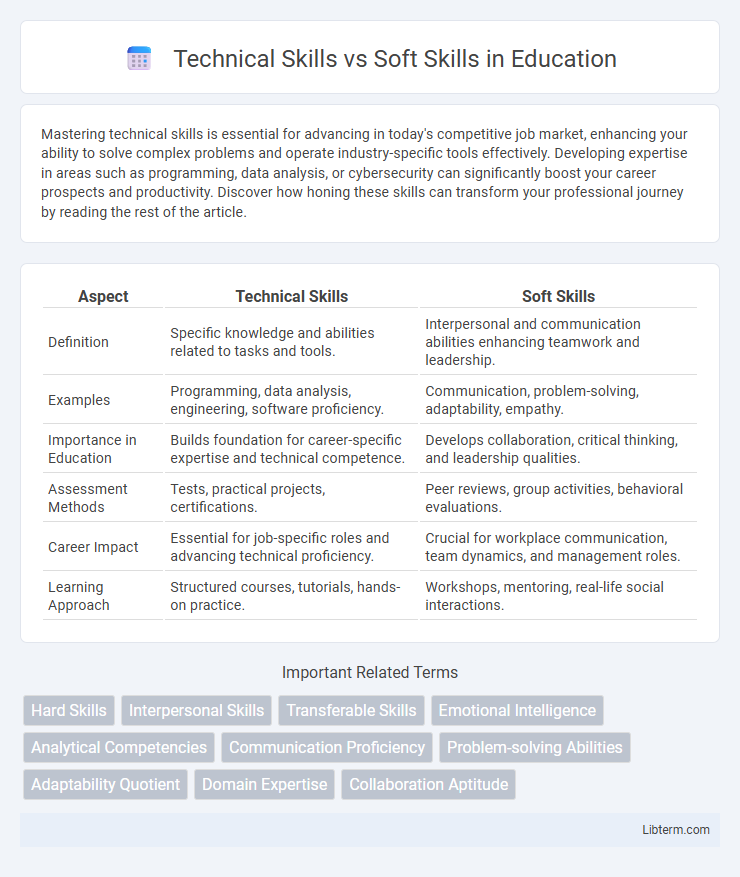Mastering technical skills is essential for advancing in today's competitive job market, enhancing your ability to solve complex problems and operate industry-specific tools effectively. Developing expertise in areas such as programming, data analysis, or cybersecurity can significantly boost your career prospects and productivity. Discover how honing these skills can transform your professional journey by reading the rest of the article.
Table of Comparison
| Aspect | Technical Skills | Soft Skills |
|---|---|---|
| Definition | Specific knowledge and abilities related to tasks and tools. | Interpersonal and communication abilities enhancing teamwork and leadership. |
| Examples | Programming, data analysis, engineering, software proficiency. | Communication, problem-solving, adaptability, empathy. |
| Importance in Education | Builds foundation for career-specific expertise and technical competence. | Develops collaboration, critical thinking, and leadership qualities. |
| Assessment Methods | Tests, practical projects, certifications. | Peer reviews, group activities, behavioral evaluations. |
| Career Impact | Essential for job-specific roles and advancing technical proficiency. | Crucial for workplace communication, team dynamics, and management roles. |
| Learning Approach | Structured courses, tutorials, hands-on practice. | Workshops, mentoring, real-life social interactions. |
Understanding Technical Skills
Technical skills encompass the specific knowledge and abilities required to perform tasks related to engineering, programming, data analysis, or machinery operation. Mastery of tools such as coding languages, software applications, and hardware troubleshooting is essential for effective problem-solving and project execution. Understanding technical skills enables professionals to adapt to new technologies, ensuring productivity and innovation in rapidly evolving industries.
Defining Soft Skills
Soft skills encompass interpersonal attributes such as communication, empathy, adaptability, and teamwork that enhance an individual's interactions and collaboration within the workplace. Unlike technical skills, which are specific, teachable abilities related to job functions, soft skills influence how effectively a person works with others and navigates organizational culture. Mastery of soft skills is critical for leadership, conflict resolution, and maintaining a productive work environment.
Key Differences Between Technical and Soft Skills
Technical skills encompass the specific knowledge and abilities required to perform specialized tasks, such as programming, data analysis, or machinery operation. Soft skills involve interpersonal attributes like communication, teamwork, and problem-solving that enhance collaboration and adaptability in the workplace. Key differences lie in their application: technical skills are task-oriented and measurable, while soft skills are behavior-oriented and essential for effective interaction and leadership.
Importance of Technical Skills in the Workplace
Technical skills form the foundation of workplace competency, enabling employees to perform specialized tasks efficiently and solve complex problems using industry-specific tools and technologies. Mastery of technical knowledge directly impacts productivity, innovation, and the ability to meet organizational goals in sectors such as IT, engineering, and healthcare. Employers prioritize candidates with strong technical proficiencies because these skills drive measurable outcomes, streamline processes, and maintain competitive advantage.
The Value of Soft Skills in Professional Growth
Soft skills, such as communication, adaptability, and emotional intelligence, significantly enhance professional growth by improving teamwork and leadership effectiveness. These interpersonal abilities foster a collaborative work environment and drive career advancement beyond technical expertise. Employers increasingly prioritize soft skills to ensure workforce resilience and successful project outcomes.
Technical Skills: Examples Across Industries
Technical skills encompass specialized knowledge and abilities required to perform specific tasks across various industries, such as programming languages like Python and Java in software development, data analysis using Excel and SQL in finance, and proficiency in AutoCAD and project management software in engineering. These skills are measurable and often certified, directly impacting job performance and productivity. Mastery of industry-specific technical tools and methodologies sets professionals apart by enabling efficient problem-solving and innovation within their respective fields.
Essential Soft Skills Every Professional Needs
Essential soft skills every professional needs include effective communication, emotional intelligence, and adaptability, which enhance teamwork and leadership capabilities. Critical thinking and problem-solving enable professionals to navigate complex challenges and drive innovation in dynamic work environments. These interpersonal skills complement technical expertise, creating well-rounded professionals capable of thriving in diverse industries.
How to Assess Technical and Soft Skills
Assess technical skills through practical tests, coding challenges, or simulations that measure proficiency in specific tools, programming languages, or industry standards. Evaluate soft skills by analyzing behavioral interviews, situational judgment tests, and peer feedback to gauge communication, teamwork, problem-solving, and adaptability. Leveraging assessment platforms like HackerRank for technical evaluation and 360-degree feedback systems for soft skills enhances accuracy and objectivity in the hiring process.
Strategies for Developing Both Skill Sets
Develop targeted learning plans to enhance technical skills through hands-on experience with relevant tools, coding languages, or software certifications, ensuring practical proficiency in specialized domains such as data analysis or programming. Simultaneously, cultivate soft skills by engaging in activities like active listening workshops, team collaborations, and leadership training to improve communication, adaptability, and emotional intelligence essential for workplace success. Integrating continuous feedback mechanisms and real-world challenges accelerates the simultaneous growth of these complementary skill sets, fostering well-rounded professional development.
Balancing Technical and Soft Skills for Career Success
Balancing technical skills such as coding, data analysis, and project management with soft skills like communication, teamwork, and problem-solving is crucial for career success. Employers increasingly seek candidates who can not only execute specialized tasks but also collaborate effectively and adapt to dynamic work environments. Developing both skill sets enhances leadership potential and drives professional growth across industries.
Technical Skills Infographic

 libterm.com
libterm.com